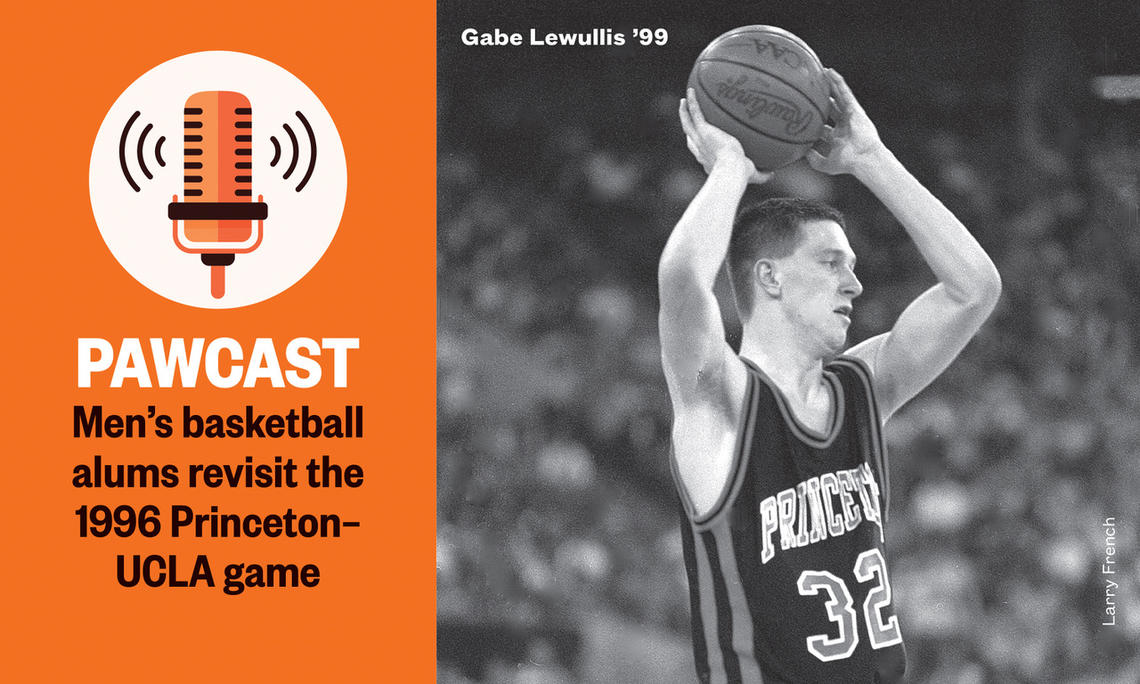
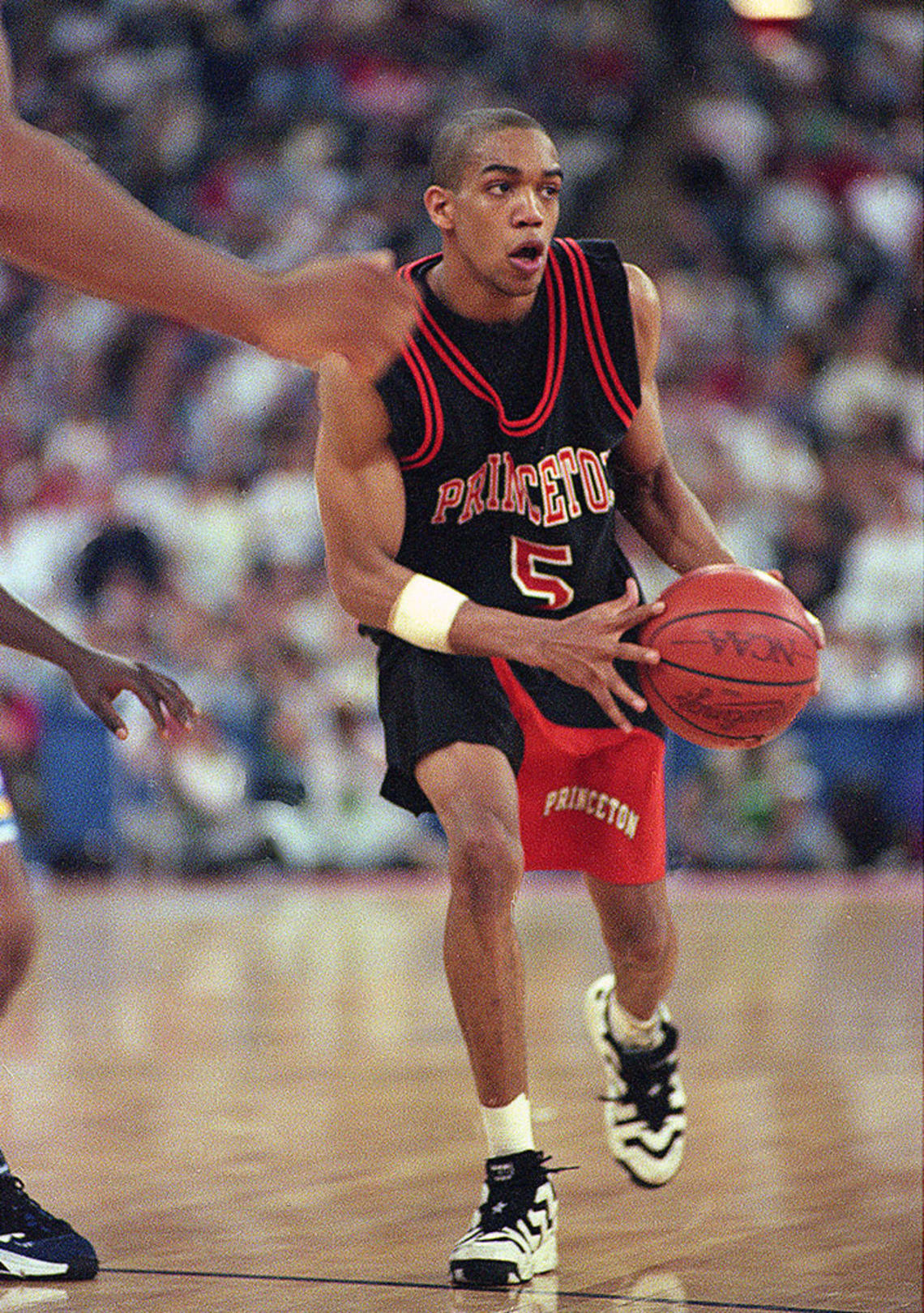
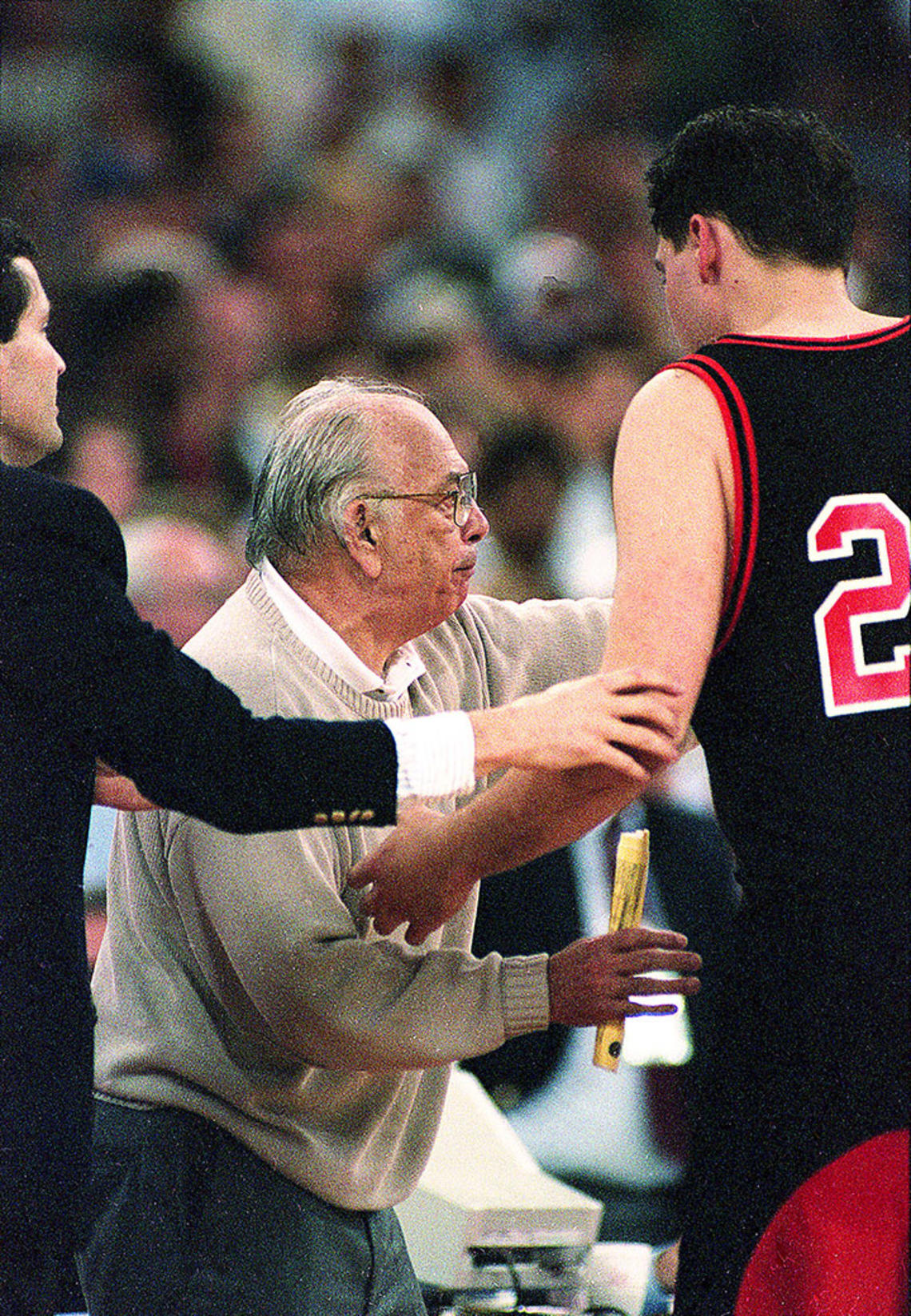
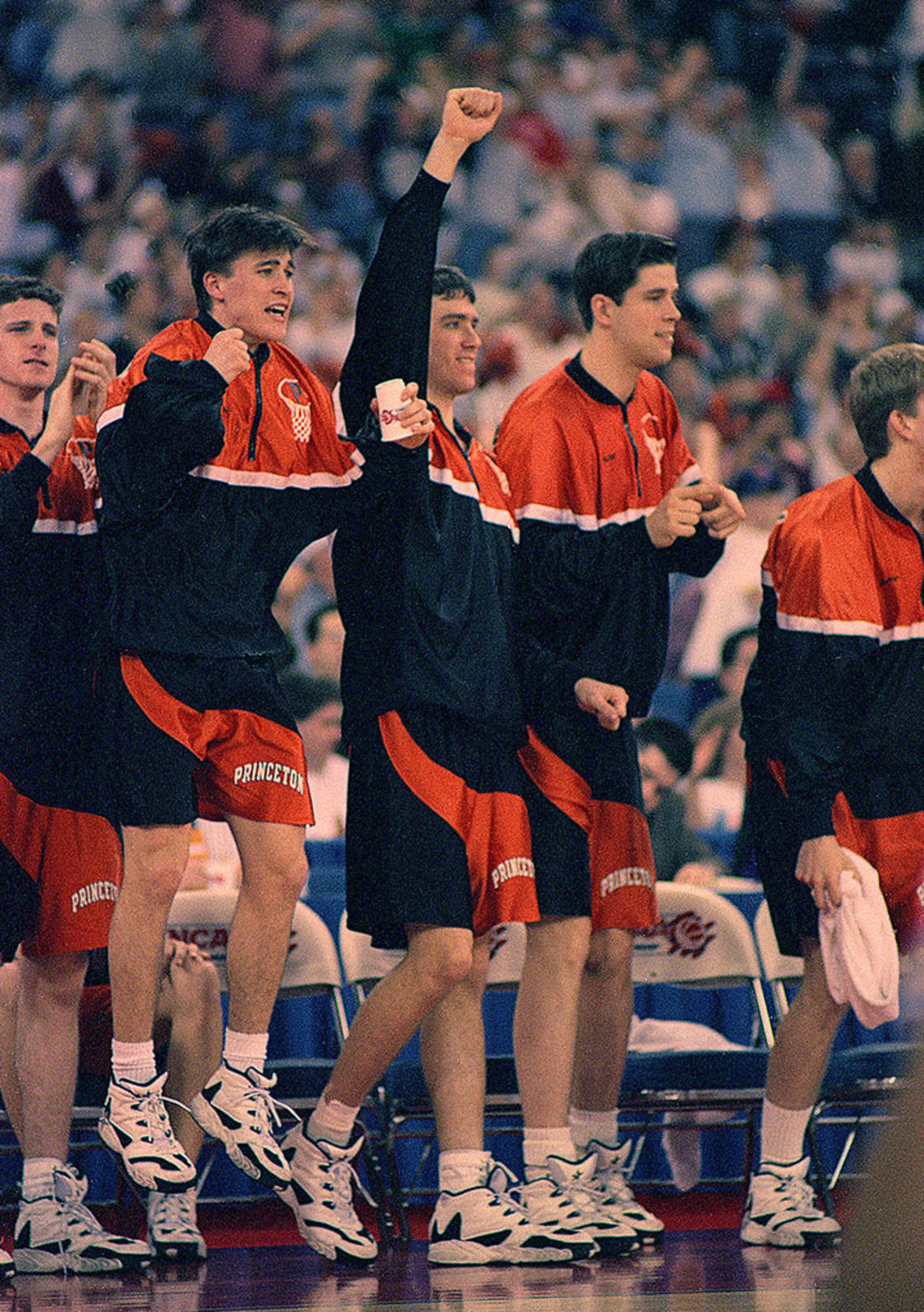
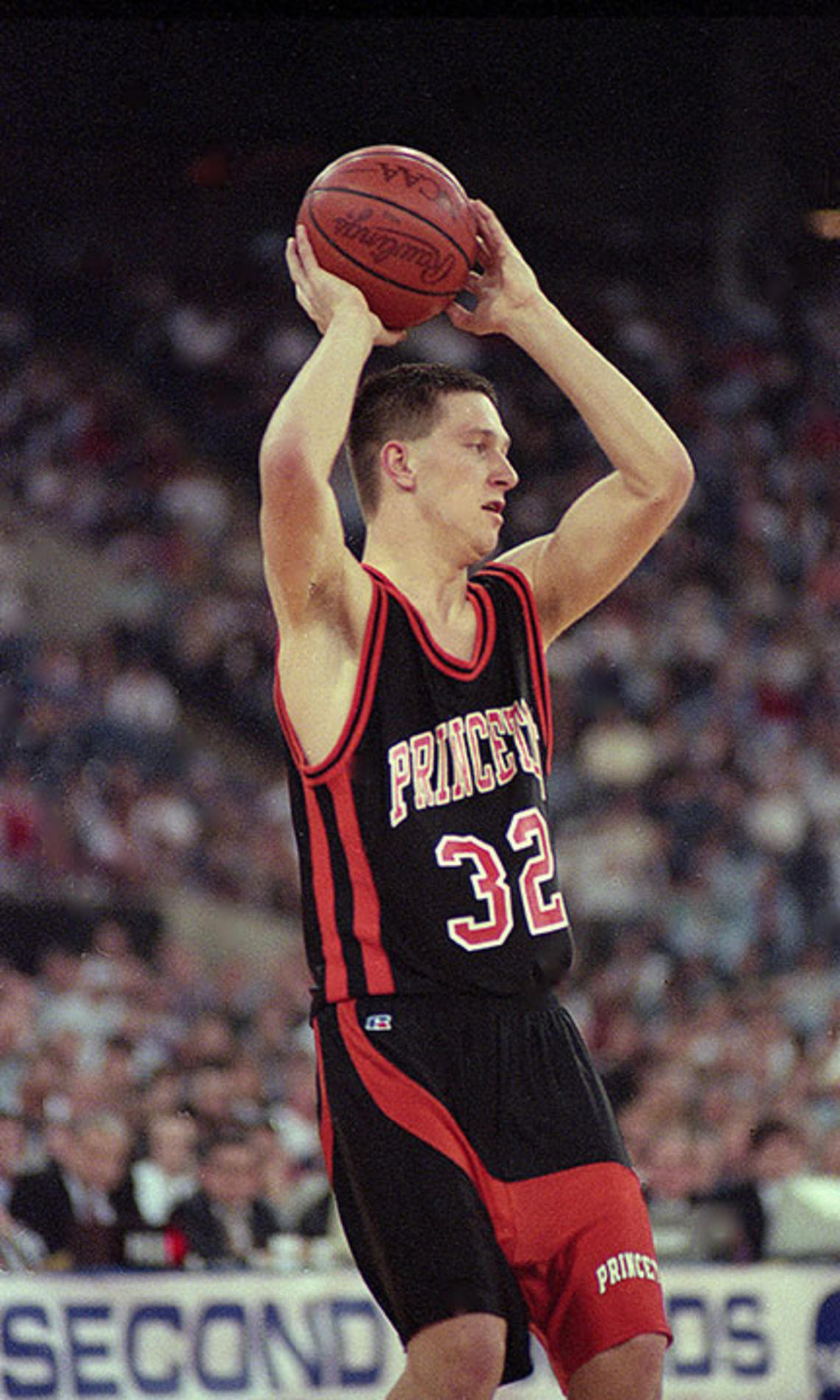
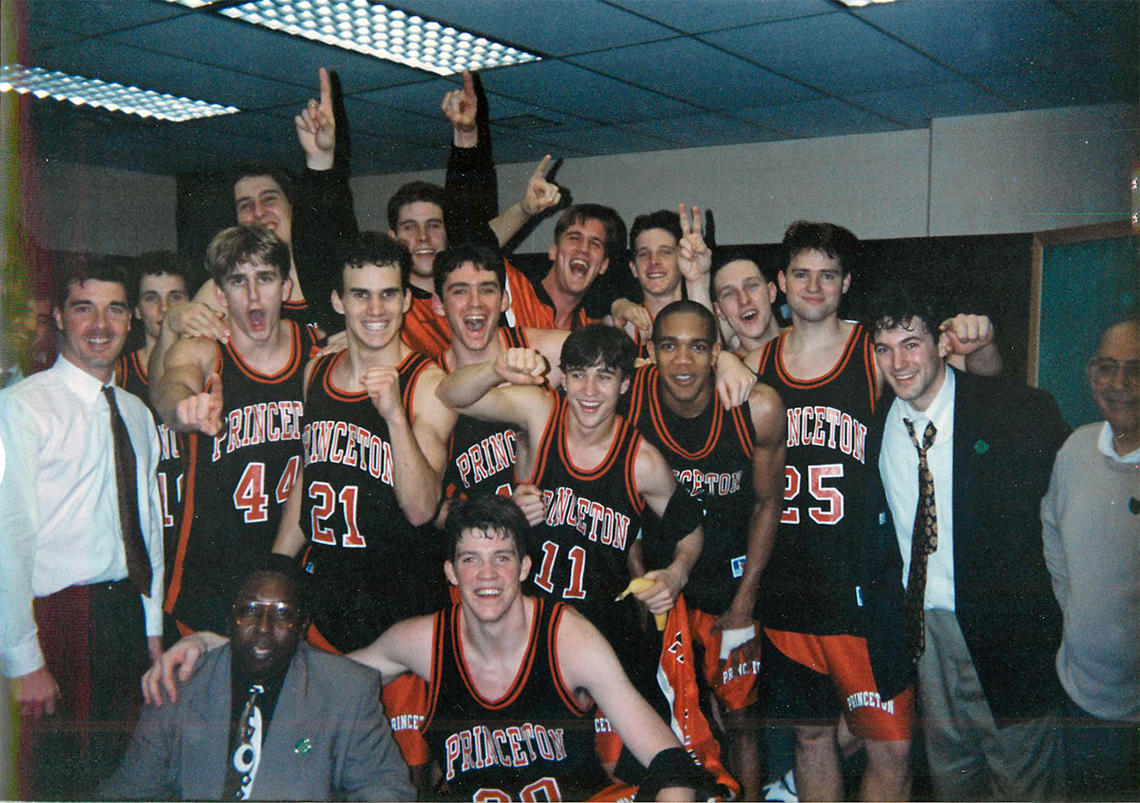
PAWcast: Men’s Basketball Alums Revisit the ’96 Princeton–UCLA Game
‘We saw ourselves not as CEOs and Wall Street guys but guys who love to play basketball’
Find more PAWcasts online here
Princeton 43, UCLA 41. Twenty-five years after the final backdoor layup dropped through the net, the Tigers’ memorable 1996 NCAA Men’s Basketball Tournament upset win lives on in the memories of fans — and not just Princetonians. On this month’s PAWcast, we talk about how Princeton knocked off the defending national champs with the starting five from that game: Chris Doyal ’96, Sydney Johnson ’97, Steve Goodrich ’98, and Mitch Henderson ’98, and Gabe Lewullis ’99.
Listen on Apple Podcasts • Google Podcasts • Spotify • Soundcloud
TRANSCRIPT
Brett Tomlinson: Welcome to the PAWcast, I’m Brett Tomlinson. It’s been a tough year to be a Princeton fan, with Ivy League sports sidelined for 12 months and counting. But the NCAA basketball tournaments are on the horizon, and we thought it would be fun to look back — 25 years back to be exact.
In 1996, the Princeton men’s team produced one of the most remarkable upsets in tournament history, beating defending national-champion UCLA in the opening round. To tell the story, we put together a podcast with the Tigers’ starting five from that game: Chris Doyal, Class of ’96, Sydney Johnson, Class of ’97, Steve Goodrich and Mitch Henderson, Class of ’98, and Gabe Lewullis, Class of ’99. Now, that’s a lot of voices, so this episode has a bit of additional editing, to clarify who is speaking when.
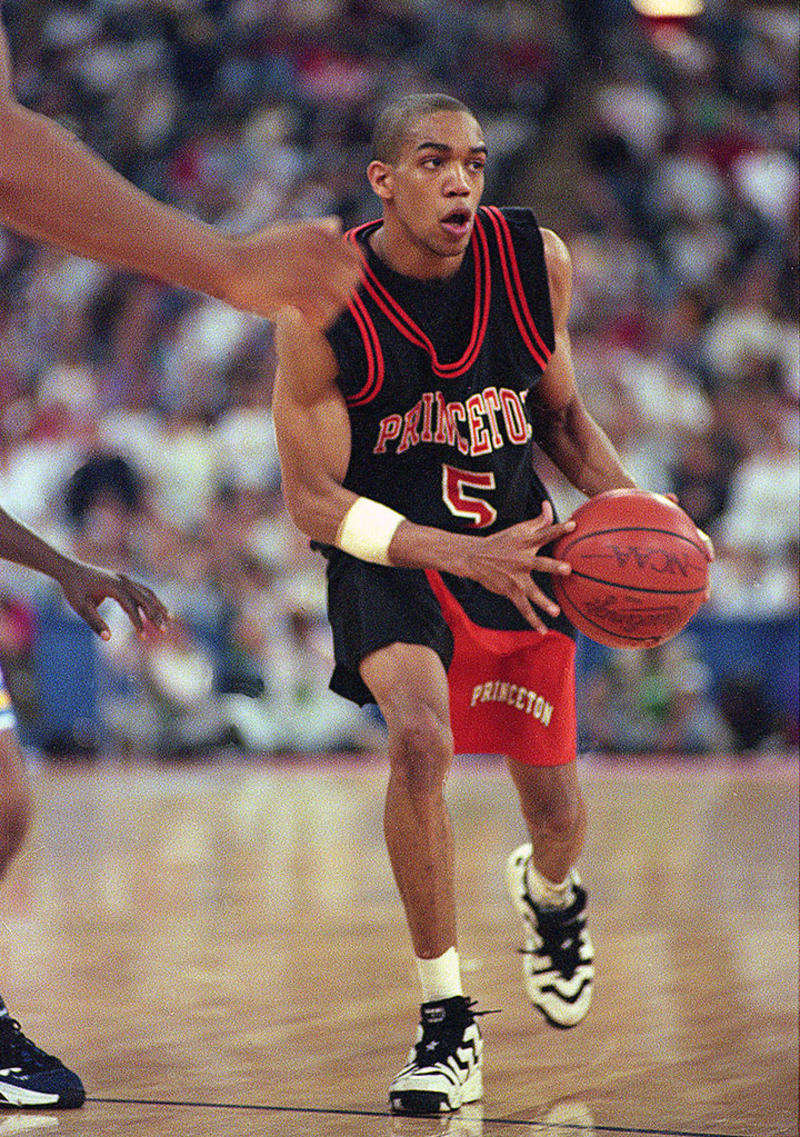
I started out by asking what it took to get to the tournament that year. Penn had won the Ivy League three years in a row. Princeton tied the Quakers for the title in ’96, setting up a one-game playoff at a neutral site, Lehigh, a couple miles from where Coach Pete Carril grew up. The Tigers won that game in overtime. It was the first NCAA bid for every player on that team, and I wanted to know, what was going through their minds when they left the court that night? Here’s Chris, followed by Steve, Mitch, and Sydney.
Chris Doyal: I just want to say, the only thing I really cared about is we beat Penn for the first time in four years. I was 0-8, and that was the first time we beat them, so it was more, we were happy just to beat Penn, as opposed to thinking about the NCAA Tournament.
Steve Goodrich: Yeah, it was a huge relief. They beat us easily both times. They were kind of in control of both the games during the season. It was the most nervous I’ve ever been before a game. Because we felt we were better than they were, but they beat us twice. Like I said, neither game was particularly close, and I remember just being so scared that we were — and then I almost blew the game. (laughs) So, we were up three at the end of regulation, and I was —
CD: Yeah, foul a three-pointer.
SG: Yeah, right.
Mitch Henderson: Throwing yourself right under the bus, Steve.
SG: Yeah, and then I fouled out. These guys bailed my butt out, but it was super — like super — it was the best feeling. I mean, the worst I felt going before a game, and the best I felt after. It was such a relief.
Gabe Lewullis: Cutting nets down is like, you see people doing it in college, and you dream to do it, and we actually did it. I’m from the Lehigh Valley, Bethlehem area, Allentown, and I was able to do it in my backyard. That emotion of cutting the nets down, and then being pulled down by Coach Thompson saying, we’ve got to go back in the locker room, and then Coach Carril announcing his retirement to us, like so many emotions at that moment.
Sydney Johnson: I literally was on the bottom of a pile of students as they rushed the floor, and for a split second I was actually worried for my life — I vividly remember that. And just so elated, and then we go in the locker room and Coach writes on the board, “I’m retired,” and it’s like it couldn’t have been further from — you know, opposite ends of the spectrum, emotionally. So it hit us like a brick wall. He said it, we kind of looked at each other, maybe a tear or two, I don’t know. And then it was on to UCLA. He never really made it about himself, as immense as he is as a coach.
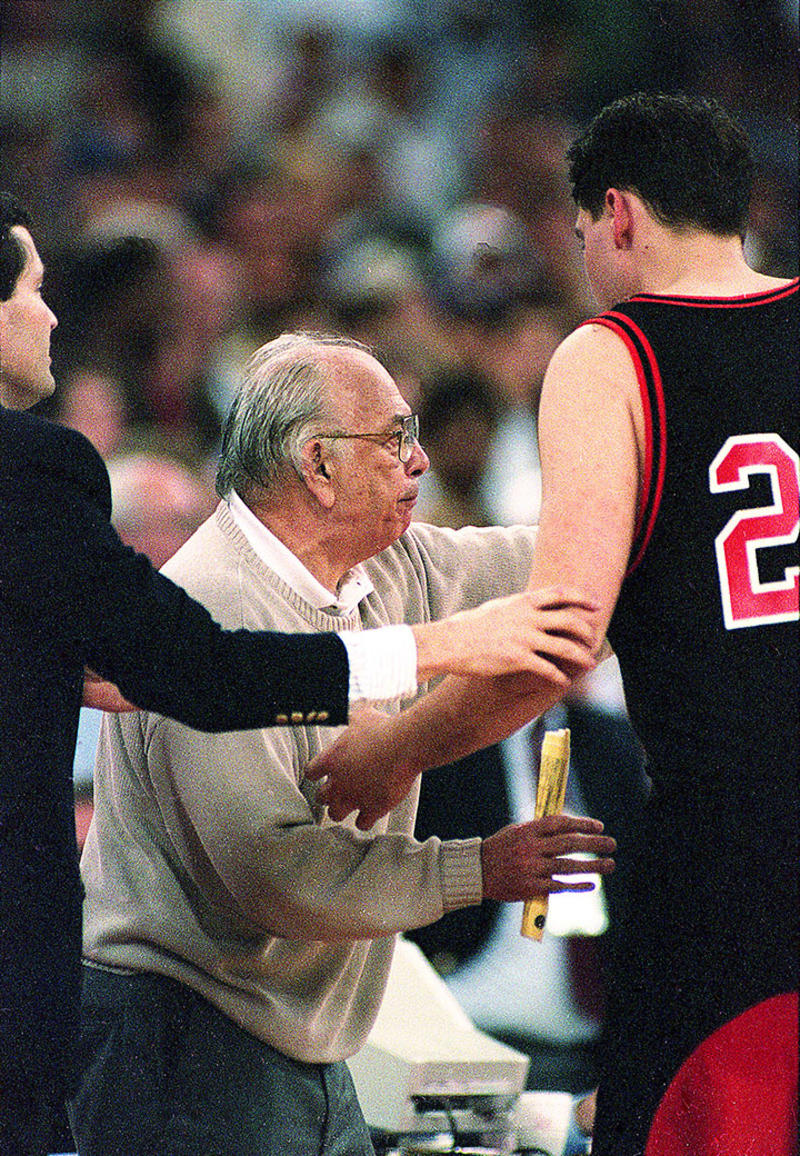
BT: Carril had been the head coach at Princeton since 1967 and had built a Hall-of-Fame résumé. The 1996 Ivy title was his 13th, the trip to the NCAAs would be his 11th. And beating Penn? Yeah, that was important too. Here’s Steve:
SG: It was really important to him to win and get over the hump, and he hated losing to Penn so much, and you know, I think he thought we had potential but weren’t achieving it. And so I just — the relief that we had kind of won and he was happy about it, and our bus ride back to Princeton was the best bus ride we’ve ever been on, of just —
GL: Amen, amen. (laughs)
SG: — him being relaxed and happy, and singing songs, and I think there was always that jealousy of like, he was so connected to those teams when he was kind of more their contemporaries, you know, part of his retirement was, I don’t think he felt as connected to the players as he did — before I mean, he was a great coach, always super engaged as a coach, but maybe not the same bond he had with the kids. So it felt really good to be connected with him and kind of give him that experience that he really wanted and that we, obviously, we were dying to give to him.
BT: In the opening round, Princeton was matched up against UCLA — one of the most storied teams in college basketball history and the 1995 national champs. The game would be played in Indianapolis’ RCA Dome. Here again are Chris and Steve.
CD: Going into the tournament, we wanted to go somewhere that wasn’t cold in the northeast, and we were praying to go anywhere other than Connecticut or New York, or — and when they said, oh, we’re going to Indiana, it was like, Oh, my God, this is the best, just because we wanted to get as far away from the northeast as possible.
SG: Just the experience of kind of living in parallel to people who were playing at programs that were flying around the country to play games, and had shoe contracts and national this and that — the program is kind of one of the most important things in the school. And Princeton, it’s not like that — which is great. But, I remember, even talking to Rick [Hielscher ’95] when we were freshmen and he was a senior about going to the tournament, how everything’s different, and the way, you get treated as a team, and there’s a dais, and you’re doing all these interviews, and there’s big press attention, and fans come to your practice. All this stuff that going around Ivy League gyms you don’t experience. It was just — that was exciting, because we didn’t know what that was like. It was good to get that experience.
BT: To match up with UCLA, Carril and his staff chose an unusual game plan, revamping the entire defense in a few short days. Here’s what Mitch, Gabe, and Sydney remember from the preparation.
MH: We played almost all man-to-man, Brett, in the Ivy League. And in fact, Sydney was our best defender by a mile, and he generally would shut down the other team’s best player. But we played a matchup zone against UCLA. And you know, I thought we were going to lose by 60 in the first two minutes of the game, we were down 7-0 really fast. It was the last game of the evening, so it was maybe a 10:15 tip. And we, as the ball went up for the jump ball, I think we all ran back; I don’t even think we went for the tip. Which didn’t help us to start the game. But, I remember the energy being great in the building once we got out of that hole early on.

SG: You won’t get it anyway. (laughs)
GL: They’ll likely go in and, you know, fast-break dunk, or a layup. So like that really sticks to me to this day of how odd the preparation was for that game.
SJ: You know, we had won a lot of games that year so whatever they told us we were going to try to do. We were like fully confident and committed in what they were telling us. But I do remember — Mitch talked about we were man-to-man team almost the whole year and then all of a sudden they’re coaching a matchup zone for us and maybe we’re kind of looking at each other. Alright, we’ve got to be all-in. And so whether it was the match-up, whether it was running back, not pursuing offensive rebounds — whatever they were telling us, it worked, so we were just going to follow it.
They were going to put a game plan together to win every single game we played. That’s what I loved about them: They were always game-planning for a win, and that’s certainly what we learned following their lead.
BT: The Tiger starters also were prepared to be on the floor for virtually the entire game: Carril only used two players from his bench, and only one — freshman Brian Earl — played significant minutes. Here are Mitch, Steve, and Sydney.
MH: It’s interesting, so Brian actually led us in scoring for parts of the year, and came off the bench; it was usually Brian, and I came off the bench the whole year. But we rarely subbed, and we never called a timeout.
SG: He didn’t — he wasn’t a big substitution guy (laughs) unless he was really mad. He wasn’t like a strategic rotations type of guy.
SJ: I’ll just tell you, I remember in my freshman year playing at Providence when they were really good, and I motioned over to I think it was Carmody or Coach Scott, you know, “I’m tired, I need a break.” And Carmody looked at me and said, “Don’t get tired.” Just, “Don’t get tired.” So it’s just those types of things. You learn these lessons, and so then you go into a UCLA game and you’re just like, “Don’t get tired.”
BT: The RCA Dome was an NFL stadium, filled with people who’d stuck around from the previous games, so Princeton had a big crowd that seemed to really get behind the Tigers — and they noticed. Again, Mitch and Steve:
MH: Steve had this thing where he would get upset, and he would throw his arms forward. And he got — he took a lefty hook, and Jelani McCoy swatted it. It was a clear goaltend.
SG: (laughs) It wasn’t that clear.
MH: And Steve said in a very high-pitched voice, “Goaltending!” you know, screaming it out. And the place went nuts and was booing the officials. And that for me, in the first half, was like, they’re on our side.
Then the second moment, and if you guys can — I’m sure there’s other moments, but [Indiana Pacers star and UCLA alum] Reggie Miller — I’m from Indiana, and Reggie Miller was at the game. We did not know this, we were in a timeout, but later it was told to us that he was at the game wearing his hat backwards, and they put him up on the RCA Dome videoboard. And he turns his hat around, and it says UCLA, and he points at it. And he’s a legend, I mean he is a legend there, everybody loves Reggie. And they booed him, like crazy.
So, if you look at the bench, if you watch the bench in that game, Brett, like those are all of our — our team’s very close. But there’s a lot of smiling. It was a very — like I said, very much of a happy moment.
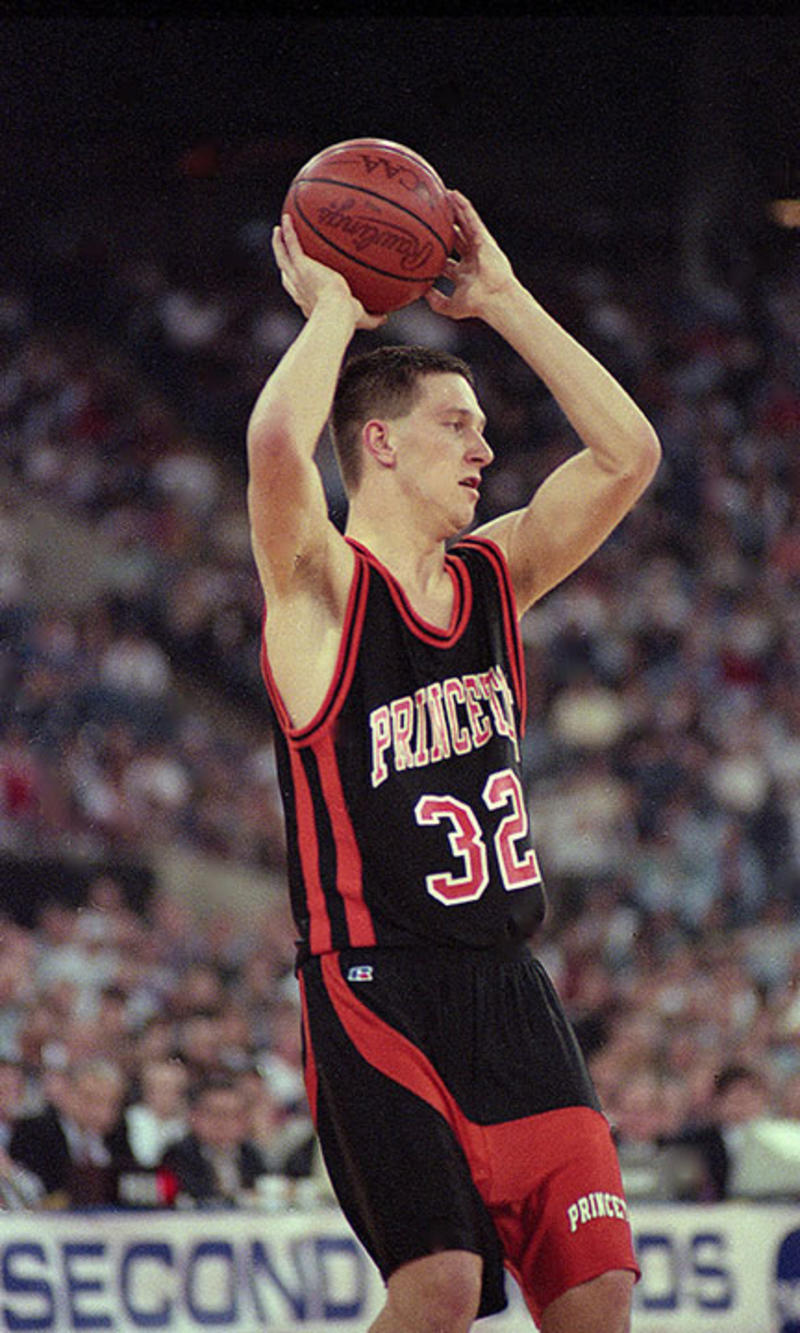
SG: Yeah, I think the other thing is like, you know, people are used to watching those games where the underdog puts a little scare in somebody, and then things even out, and the course of the game goes on, and they kind of slowly pull away. So I think there’s just a general energy like, wow, this actually might be a close finish. So you can just win that momentum a little bit just by staying in the game, it keeps people engaged. If this was a 20-point game at half, everyone would have left. The fact that we were able to hang around and, run the play at the half, and it’s a game, and come out and stay close in the second half, that made it —you’re bound to kind of just bring some momentum on just by that energy.
BT: After a slow start, Princeton stayed close throughout the first half. The new defense was certainly working, and the Tigers, down by three, set up a play in the final minute of the first half. The result: a wide-open backdoor layup by Gabe, on a feed from Steve. UCLA led 19-18 at the half.
The second half was more of the same. With six minutes left, Princeton trailed 41-34, but the Tigers chipped away: A long three by Sydney. A baseline layup by Steve. A fast break layup by Sydney — set up by Chris’ steal — tied the game. Meanwhile, UCLA had gone cold. Here’s Sydney.
SJ: What gets overlooked a decent amount is, I had an intentional foul that gave them some free throws. I always remember that one. I mean, it wasn’t smooth sailing for us, and that was a big play that that could’ve gone the wrong way. But they missed the free throws. And I think there was something there in the gym. That probably was a moment where I was like, “Oh my gosh, what did I do?” They missed the free throws. The crowd was cheering for the missed free throws. And I think there was like — ooh, they left the door open for us.
BT: Princeton regained possession in a tie game and called a timeout with 21 seconds left. I asked the guys to take me through the final possession: What was it that they were trying to do, and did it play out the way that they were hoping?
GL: It did play out the way we were hoping. (laughter)
SG: Exactly.
CD: For Gabe it did.
GL: It went well for me.
MH: And actually Sydney and I were talking about this not too long ago, but I remember that all of the coaches came into the huddle and they were unanimous, and the play is called “Center Forward Backdoor,” and it was drawn up exactly the way — it was supposed to get Gabe on a second backdoor attempt. And then, you guys can — Gabe and Steve, you guys can take it from there.
SG: It really set up so perfect: Gabe scored a layup on that at the end of the first half, the first play, the first version. So they called the play, scores the layup, and then they call the same play, but the counter to that play. It’s like, we don’t even run any set plays, and this play, not only did it work perfectly, but it was the perfect time to make a call like that, because it was a direct counter to the play run at the end of the first half. It’s kind of amazing that it fell that way. (laughs)
GL: Yeah, the first half, the end of the first half, it was so wide open. Like, there was no one around on the screen to make that layup. And the last play was, it was tight. Like Steve, you thread the needle. I actually got a little body from the weak-side help guy coming in.
SG: I think that was Kris Johnson. It’s a good thing Kris Johnson wasn’t Jelani McCoy, right, that would, he’s —
GL: Yes, that would have been, probably in the third row.
SG: He’s your size. (laughs)
GL: If you look, it’s funny, because we’re — I thought it was like a really ugly game that we won. We didn’t shoot well, and neither did they, but we won an ugly game. But that’s kind of what we had to do. And that last play, if Steve didn’t pass me the ball, if you watch the other side, we didn’t really run the play. (laughter) I think we were trying to get a double for a three in case —
MH: I was watching, I was watching.
GL: There was nothing going on over there, so we would have been screwed if Steve didn’t throw the ball. So it — again, the basketball gods were with us because we made the layup and we won the game, and you know, put Carril out on a nice, nice way out of his career, I thought.
MH: So our assistant coaches were incredible. It was Bill Carmody, Joe Scott [’87], and John Thompson [’88], and they all went right up to Coach and they were patting him on the back, and there was very much of a sense of something that had happened that was big for Coach.
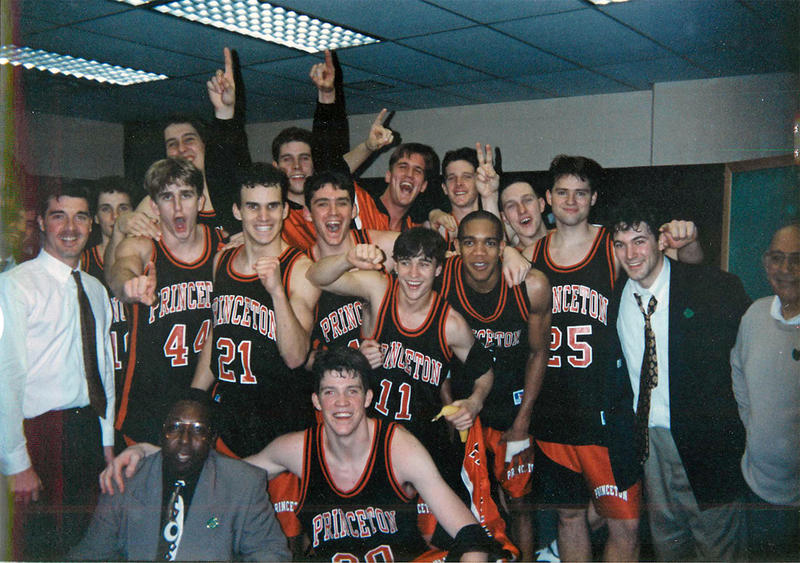
BT: I asked Mitch and Sydney, both college coaches, if they had gained a new appreciation for how much has to go right for a moment like that to happen.
MH: That’s the perfect question. It’s so hard to get there. You know, I mean, we played Penn in the first Ivy League playoff game [in 2017] and barely won, had to win in overtime. It felt very similar, and it was the same effect on me personally, it almost ended me.
I remember at the start of overtime, against Penn at Lehigh, I mean Coach Carril was — he was very upset that we were playing in an overtime game. Yeah, so I understand that. Also, a lot of really good players on that team. And, you know, you have to make big plays and get a little lucky, and again, Sydney — I mean he made so many big plays that season, but the two big threes in that game, to get it back to tied at 41, really stood out.
SJ: Again, we’re not the best Ivy League team that’s ever played, but we were like battle-tested, Brett. We really were. And I was the worst of the five players on the court for Princeton, I mean these guys are really good; Mitch and Steve, Doyal, Gabe, Brian Earl, phenomenal freshman year, coming off the bench.
We were focused. We believed in the plan, and if you put us in a game, we were going to try to win and do what we do — and have some emotion, have some personality, have some belief, have some confidence — because we were a winning team.
BT: The Daily Princetonian’s front-page story read “David 43, Goliath 41.” But the win over UCLA was not just a Princeton headline. Years later, strangers still ask the Tiger alums about that game. Why is it so memorable — and so meaningful — to basketball fans? Here are Sydney and Gabe.
SJ: I think we epitomized — you know, David and Goliath, it’s so overplayed — but I do think we epitomized that, coming from a world-renowned academic institution that plays athletics, sure, but not on the grand stage. UCLA, John Wooden, Kareem Abdul-Jabbar/Lew Alcindor, Bill Walton, and all those championships. I think it just epitomized that kind of little-guy-versus-the-big-guy.
I think the academic part — these guys are Wall Streeters and future CEOs but they’re hanging with the big boys, guys who are going to play in the NBA. And then also the way that we played where we played obviously a cerebral, team-oriented style of basketball, which some people might consider as a throwback — and it’s not — but I do think the principles that Coach Carril had us standing for and epitomizing on the court, so many things to hang onto that people could relate to, and they probably could relate a little bit more to that than they could to guys who were headed to the NBA.
And yet they wouldn’t know that there’s an incredible amount of pride from the guys in terms of being genuinely ballers and basketball players. We saw ourselves not as CEOs and Wall Street guys but guys who love to play basketball.
GL: The movie Hoosiers was amazing, it was in Indiana. It was like a perfect script to an underdog story in basketball. And I feel blessed to be a part of that team, and I think it propelled us, it propelled us to be even greater. And everyone wants to talk about the Princeton-UCLA game, but I’ll tell you, when Steve and Mitch and Stags [James Mastaglio ’98] and Darren [Hite ’98] and Bones were seniors, and I was a junior, that team was — we had a great team, and I don’t think we were there without the success, that taste of success we had on a big level, on a big stage like we had.
BT: Princeton-UCLA was not a one-night phenomenon. It was the start of something bigger — and also the continuation of a unique basketball heritage that stretches back to Bill Bradley ’65 and the storied teams of the 1960s; Carril’s early years with Geoff Petrie ’70 and Brian Taylor ’73; Armond Hill ’85 and the 1975 NIT title; and the near-miss NCAA upset bids of the late ’80s and early ‘90s against Georgetown, Arkansas, Villanova, and Syracuse.
MH: I would just say, Brett, you mentioned earlier, in my role here now, it is so clear that there’s just so few programs. You know, Steve mentioned that we were kind of a small program, but that game, it lives here every day. People that follow us and families that we recruit, that game, the players that played in it — and I happen to be the coach and was there, but I don’t get a chance to talk about it in that capacity. But it’s a very special game to the program, and you know, we were disappointed that we couldn’t — we would have honored this team this year at halftime of a game, invited all these guys back. And it’s a really important game to the history of our program, because it marked the end of Coach Carril’s time, and it marked the start of a really winning era in our history. And as Steve mentioned, it’s also the end of a college basketball-type era, where you know, you didn’t see those upsets as often back then.
SG: I think that, the other thing that’s great is just like to be, like I said before when I was talking about Coach Carril and the legacy he had of connecting teams, I think there’s just an instant connection of playing and feeling connected to the guys who played before you, and the guys who played after you. Like, you know, if you — at Reunions, everyone goes to the barbecue and plays pickup basketball and it’s, you know, people who are 20 years older than you, and now 20 years younger than you, and they all play, and there’s just, such a common connection about it.
SJ: If you watch college basketball these days you’ll see a lot of teams and they have “family” written on their warm-up shirts. A lot of teams these days, when they break the huddle: “1-2-3-family.” And we never mentioned that word, not one time. Coach Carril didn’t talk about that, that wasn’t — nothing in how we talk to each other, Brett. And yet, the love and a genuine love and affection for my teammates was so much like a family. And working for Joe Scott now, he talks to the guys about how we’re not going to mention that word, we’re not talking on that, but we’re going to behave that way.
And that ’96 team was the epitome to me, that these guys — I love these guys. And they challenged me and I challenged them. And we actually got in some fights every now and then because we were asking more of each other. And then we celebrated each other’s successes, and that’s what a family does. So I just wanted to add that. It’s not a word that we talk about in the Princeton basketball tree, but we behave that way. We get on each other, we challenge each other, we laugh with each other, and as much as anything, we celebrate each other’s successes. And it’s just been such a heartwarming part of my life to be attached to these guys and these coaches.
BT: At the end of conversation, we went around the virtual table to hear where these five Tigers are today, starting with Chris Doyal:
CD: So I’m over in London, I’ve been over here since 2006. I made another great decision to come work here for Lehman Brothers, you know, that worked out really well. (laughs) So, after that, so I’m still in finance, but I’ve been over here for about 15 years. So I’m officially a Brexan, which is a British Texan.
BT: Sydney Johnson:
SJ: I’m associate head coach at the Air Force Academy for the men’s basketball team, working for Joe Scott, who obviously was one of the assistants on staff during that ’96 game. I’m having the time of my life just back coaching the Princeton offense. And I’ve got three beautiful kids and a lovely wife, who I met at Princeton.
BT: Steve Goodrich:
SG: I work doing community development lending. So we lend money to consumers and small businesses in undeveloped communities that are underserved by banks. So I have a small, independent business that was doing that, got bought by a larger bank. And so I’m working with them, and going to probably spin out and start another one to do something smaller in consumer finance.
BT: Mitch Henderson:
MH: I’m the head coach here at Princeton. I live in Princeton. I have three kids. I just, I rarely do this, I just had a Hoagie Haven sandwich. And we have practice today for the first time in 11 months, so it’s nice. We’re getting — you know, we’re not going to play any games, but nice to get the chance to, as soon as we get off here with you guys, we’re going to go on the court together for the first time.
BT: And Gabe Lewullis:
GL: I’m an orthopedic sports-medicine surgeon in Allentown, Pennsylvania, Director of Sports Medicine at Lehigh Valley Hospital, in my hometown. Have three boys.
BT: For the very last word, I’ll defer to Quinn Buckner and Gus Johnson, who were on the call for CBS Sports on that fateful night in 1996:
Quinn Buckner: You know they’re gonna try to run a backdoor play if they can get it.
Gus Johnson: Under 10. Backdoor — Lewullis — he got it!
QB: He got it!
GJ: Three-point-nine remaining. He got it!
QB: Signature play for Princeton is backdoor. Goodrich misses the first time, dribbles toward the man, goes back this time, no doubt about it, very nice backdoor. Lewullis is able to get it in. And watch the bench just go berserk! (laughs) Can you believe it?
BT: PAWcast is a monthly interview podcast produced by the Princeton Alumni Weekly. If you enjoyed this episode, please subscribe. You can find us on Apple Podcasts, Google Podcasts, Spotify, and Soundcloud. You can read transcripts of every episode on our website, paw.princeton.edu. If you look at this episode transcript, you’ll also see some great photos of the game. Music for this podcast is licensed from FirstCom Music.
Paw in print
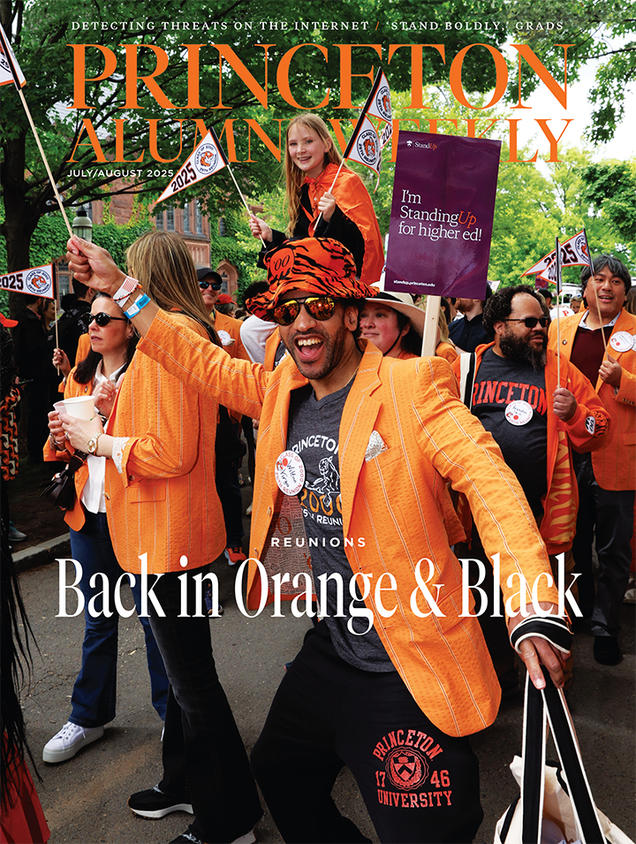
July 2025
On the cover: Wilton Virgo ’00 and his classmates celebrate during the P-rade.
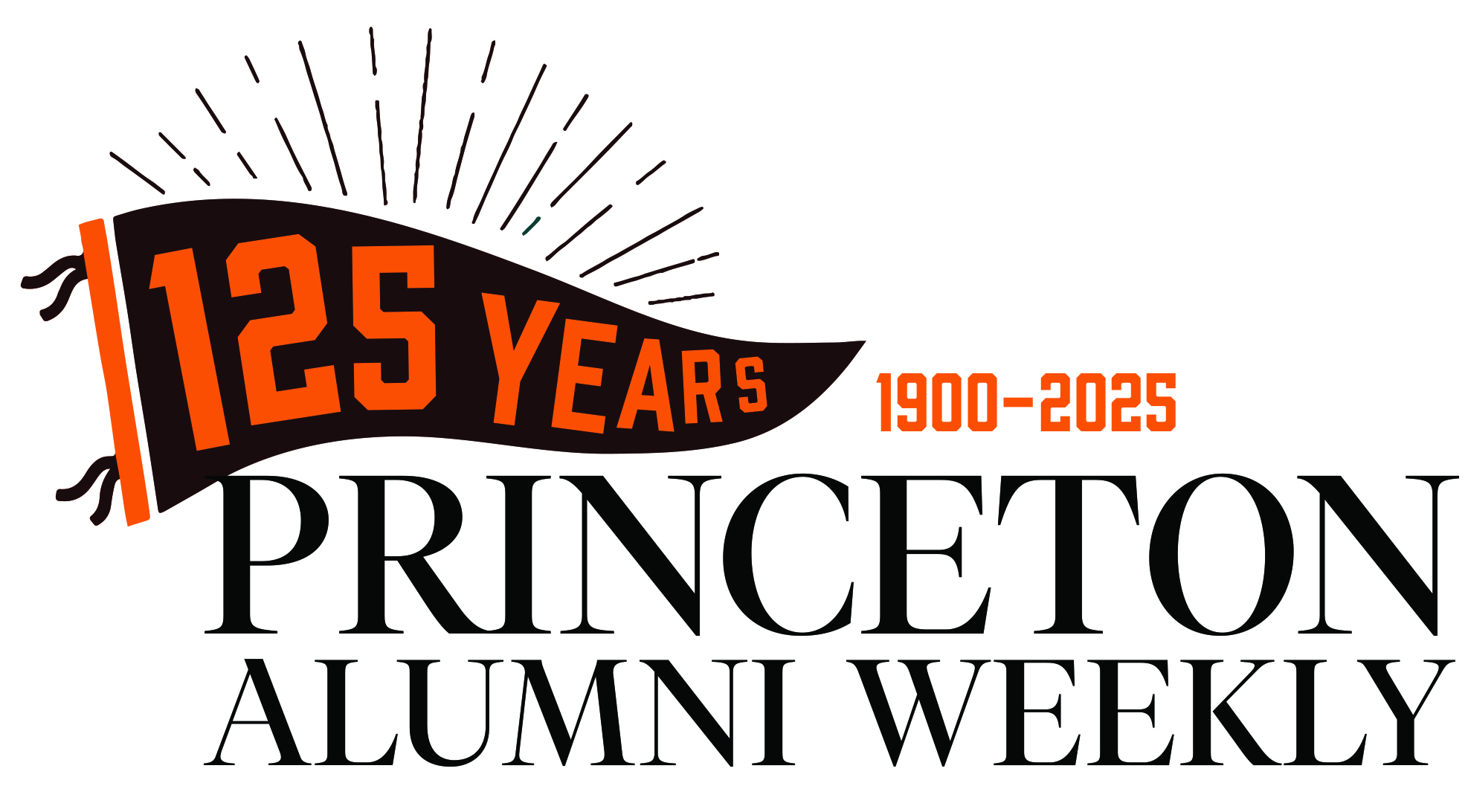

1 Response
Robert McCarty ’55
4 Years AgoExcellent, Thanks
Terrific — thank you. I have watched both the Penn game and UCLA on YouTube.
Editor’s note: View the full game here — Princeton vs. UCLA, March 14, 1996